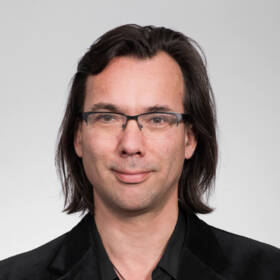The research and art project Wearable Theatre. The Art of Immersive Storytelling explores the dramatic, narrative, and structural potential of Virtual Reality (VR). Over three years, an interdisciplinary team delves into the connections between art and technology, immersion and empathy, and virtual reality and literature.
Literature and virtual reality
Whereas traditional forms of artistic expression – such as film, theatre or literature - depend on conventional, linear forms of narration, Virtual reality offers new creative possibilities to increase empathy and immersion. Artistic components like story, setting and sound create 360° VR stories or performances that users can experience via an appropriate headset. This image of a wearable theatre is also, where the project title has taken its origin. The intentional implementation of points of orientation and points of attention, the two key principles of VR, will result in high empathy and user response.
How Technology Tells Stories
This project aims to reveal and make accessible the dramatic, narrative, and structural potential of storytelling through concrete implementations. An interdisciplinary research team—specializing in directing, media art, acting, dramaturgy, media technology, and composition—adapts examples from world literature into 360° VR scripts, bringing them to life with advanced technology.
The goal is to establish 360° VR as a new experiential medium for literary works. Authors with existential and atmospherically rich storytelling styles serve as the foundation for the research. Literary perspectives are combined with aesthetic variables to fully harness the visual, acoustic, and atmospheric potential of 360° VR in a dramatic context.
These developed VR narratives are analyzed based on the following research questions:
- How can literary material, especially „first person narratives“ be transferred into VR-space, and which deductions can be made from the dramatic feedback as to VR-storytelling in general?
- How would a prototype of a 360° VR shooting script look, and to what extent do the Points of Orientation and Points of Attention have to be preconceived and linked to the dramatic events by the author in order to make intelligible production possible?
- What are the aesthetic variables of 360° VR-storytelling and how can they be used by directors, actors, set-designers and media artists to serve the narrative?
- How must the Points of Orientation and Points of Attention be organised in order to create a fluid, rhythmic and distraction-free narrative experience?
- Which technical limitations are inherent in 360° VR-production and how must the interfacing between camera operator, director and actor be organized in a 360° shooting script?
Dostojewski digital
The twelve-part experimental series begins with authors known for their existential and atmospheric storytelling: 360° VR adaptations of Fyodor Dostoevsky’s The Demons, Max Frisch’s Homo Faber, and Albert Camus’ The Fall will be explored over the next three years. Each of the twelve experiments will focus on a specific experiential aspect of the 360° medium, examining elements such as character design, sound, and user-protagonist interaction.
Beyond addressing questions about new forms of representation for traditional art and the technical implementation of these works, the interplay of science, technology, and art seeks to uncover fresh perspectives and storytelling patterns for VR formats. The project aims to inspire a unique artistic form of expression, perception, and experience—one embodied in the concept of a Wearable Theatre.
Press Coverage
Deutschlandfunk, Corso, 03.05.2017: Markus Wintersberger and Markus Josef Weiss talk to Adalbert Siniawski
Publications
You want to know more? Feel free to ask!
Lecturer
Department of Media and Digital Technologies
- Conservatory for Acting OAA-Vienna: Colleen Rae Holmes, Marcus Josef Weiss
- sound:frame, Eva Fischer

